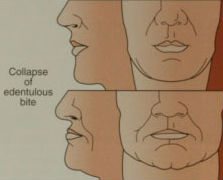Facial collapse is a serious health condition that progresses over a number of years when patients lose all or most of their teeth. You may have seen this condition in others—it gives the face a shrunken-in look. You can see this in the drawings below. And it results from the bone loss that naturally takes place when we lose our teeth.
The Cause
 Most of us never think about it, but the structure of our teeth, with their roots that extend into the jawbone, actually keep the jawbone healthy and stable. When we lose just one tooth, the body automatically responds by beginning to absorb the minerals that make up the jawbone under it. And when we are missing many teeth, the jawbone is reabsorbed over a larger area. In as little as ten or twenty years, this process can lead to facial collapse.
Most of us never think about it, but the structure of our teeth, with their roots that extend into the jawbone, actually keep the jawbone healthy and stable. When we lose just one tooth, the body automatically responds by beginning to absorb the minerals that make up the jawbone under it. And when we are missing many teeth, the jawbone is reabsorbed over a larger area. In as little as ten or twenty years, this process can lead to facial collapse.
Why is Facial Collapse a Serious Condition?
The ridge of jawbone in a mouth without teeth, or with few teeth, supports dentures. Over time, if that support diminishes through bone loss, it can become impossible to chew efficiently because the dentures will no longer be supported. This leads to a situation in which people are relegated to eating only soft foods, and such a diet can lead to more serious conditions.
Dental Implants Can Prevent Facial Collapse
Dentures cannot prevent facial collapse because they only replace the visible portion of the tooth. Dental implants, however, are titanium root forms that are surgically placed into the jaw. As they heal, the body osseointegrates them, meaning that it deposits more bone-growing minerals around the threads of the implant, making the implant part of the bone.
Even if there has been bone loss, bone grafting has proven to be effective in providing a stable foundation for implants, and once the implants are in place, more bone-building minerals will be deposited at the root sites. Just a few dental implants used to anchor dentures can prevent the further progression of facial collapse.
If you’d like to learn more, you can read our dental implants page. If you’re ready to move forward, you may call our office or request an appointment online.